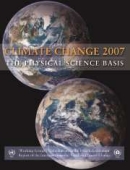 “…serious and growing questions over the standards and credibility of the international body whose job it is to determine the scientific truths about climate change.”
“…serious and growing questions over the standards and credibility of the international body whose job it is to determine the scientific truths about climate change.”
The Listener is not going to be left out. Ruth Laugesen writes in the current issue that “probes by a variety of international media have uncovered a smattering of poorly based and even shonky assertions” in the IPCC reports. By the time she comes to list them later in her article they have become “potential inaccuracies”. The list is familiar enough. First is the Himalayan glacier melt rate, which has been acknowledged by the IPCC as a regrettable error. Of the other four, two track back to Jonathan Leake at the Sunday Times – dubbed Amazongate and Africagate – and both have been shown up as lacking any substance by Tim Lambert here and here. Another refers to the mistaken statement that 55% of the Netherlands is below sea level when the correct figure is 26%, yet Laugesen acknowledges that this relied on a figure supplied by the Netherlands Environmental Assessment Agency. The remaining item concerns the reliability of data from weather stations in East China used in a research paper by Phil Jones and others published in Nature in 1990. Jones has reasonably responded to the accusation of fraud here.
Against the massive and impressive IPCC reports these are all matters of negligible substance, as anyone who has cast an eye over the reports would immediately recognise. Only one of them reveals a clear failure to observe the processes and standards expected of the IPCC authors. It is absurd to suggest that they add up to serious and growing questions. All they add up to is a demonstration of how savagely determined climate change deniers are to cast doubts on climate science by whatever means they can find. Is it too much to ask that a staff writer for the Listener treat her “international media” with more caution? Journalists around the world seem to be engaged in an operation where you simply pass on something you have read about climate science in another publication without feeling the need to check on its initial reliability. The more this happpens the more the story becomes entrenched. And the longer the public is left thinking there may be some deep uncertainty about human-caused climate change. The abdication of intellectual responsibility is alarming.
And it’s not only journalists who are letting the public down. Depressingly, and I wish I could add surprisingly, Climate Change Minister Nick Smith when questioned by Laugesen has chosen not to deny the notion that the IPCC report is untrustworthy. “It does raise questions – if those parts of the report have mistakes in them, what about the rest of the report?…The reality is that governments respond to the mood of the public. And the fact that there are errors in the IPCC report is of concern.”
He says that the errors will be one reason for the government being “a bit more cautious” on climate change policy. How much more cautious can the government get without giving up on the issue altogether? If Smith is taking his lead from the mood of the public he should not be occupying the post of Climate Change Minister. He has access to expert scientific advice. He should be telling the public how serious the situation is, not letting their mood be determined by superficial journalism.
He even has the nerve to advise the 16 NZ scientists involved in the IPCC process that “it is better to pursue quality than quantity.”
Thankfully Laugesen includes comments from NIWA’s chief climate scientist, David Wratt, NZ’s representative on the 31-member IPCC governing bureau. He introduces a note of sanity into the article. One hopes the Listener readership is sophisticated enough to see with whom the truth lies, but journalists certainly aren’t making it easy.
Like this:
Like Loading...
 The Heartland Institute, the US organisation that plays a key role in organised climate denial, has directly funded New Zealand’s most prominent sceptics, a search of US Internal Revenue Service documents has revealed. In 2007, Heartland granted US$25,000 (NZ$32,000) to the NZ Climate “Science” Coalition, sending the money to NZ CSC member Owen McShane. They also gifted the International Climate Science Coalition US$45,000 (NZ$59,000), forwarding the cash to NZ CSC webmaster and ICSC founding chairman Terry Dunleavy. The documents do not reveal what the money was used for, but four NZ CSC members attended the December 2007 Bali conference as part of an ICSC delegation. Bryan Leyland, energy advisor to both CSCs, confirmed in 2008 that “some expenses” for the trip had been covered by Heartland, but the NZ CSC has never revealed the full extent of the Heartland Institute funding of their operations, or its role in the expansion of their “climate science coalition” franchise.
The Heartland Institute, the US organisation that plays a key role in organised climate denial, has directly funded New Zealand’s most prominent sceptics, a search of US Internal Revenue Service documents has revealed. In 2007, Heartland granted US$25,000 (NZ$32,000) to the NZ Climate “Science” Coalition, sending the money to NZ CSC member Owen McShane. They also gifted the International Climate Science Coalition US$45,000 (NZ$59,000), forwarding the cash to NZ CSC webmaster and ICSC founding chairman Terry Dunleavy. The documents do not reveal what the money was used for, but four NZ CSC members attended the December 2007 Bali conference as part of an ICSC delegation. Bryan Leyland, energy advisor to both CSCs, confirmed in 2008 that “some expenses” for the trip had been covered by Heartland, but the NZ CSC has never revealed the full extent of the Heartland Institute funding of their operations, or its role in the expansion of their “climate science coalition” franchise.
 As I walked past the magazine stand at the supermarket this week my eye was caught by the front cover of the this week’s
As I walked past the magazine stand at the supermarket this week my eye was caught by the front cover of the this week’s  “…serious and growing questions over the standards and credibility of the international body whose job it is to determine the scientific truths about climate change.”
“…serious and growing questions over the standards and credibility of the international body whose job it is to determine the scientific truths about climate change.”  It’s possible that
It’s possible that